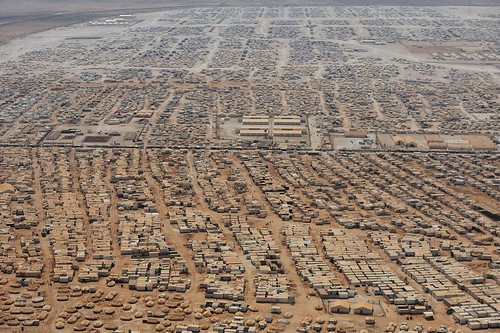student housing, Global U
I used to think of "eight million" as the size of a really big city, like Tokyo.
Assuming a global population of eight billion, that's a thousand Tokyos worth of people.
About eight Tokyos, or sixty-four million, live in refugee camps. These numbers are not precise, nor are the definitions (what's a city if not a more permanent kind of camp?).
After an increase of five million last year, the number of people displaced by conflict – refugees, asylum seekers or those displaced internally – was at an estimated 65.3 million by the end of 2015.
It is the equivalent of one in every 113 people on the planet, according to the UN Refugee Agency, and if considered a nation would make up the 21st largest in the world. [ source ]As a contributor to General Systems Theory (GST) for some decades, I've built up a model of the "Global U" (Spaceship Earth) in which each one of us is doing work / study, which nets us a livelihood in some way. We survive, one day to the next, in "work / study scenarios".
Two "credit wheels" come into play, the input wheel (like a pie chart) and the output wheel (ditto). A pie chart is apropos as not only does it let us partition income, the radius of the circle itself is a variable.
What I call a "personal workspace" (PWS) is between inflow and outflow and represents "value added" or "difference made". Given these sources of input, including nutrients, all sustenance, information, props, opportunities, what outputs did I create? What difference did I make?
Clearly these are very generic concepts, intentionally. In application, we might focus on a Global U student in a tent, call him Jack, call her Jill (is she a girl scout?). Jack is learning about germs i.e. bacteria and viruses, while Jill is learning about environmental contaminants. They're siblings and definitely compare notes on what they're learning as these topics overlap.
These are also topics of vital everyday interest as the camp struggles to improve. Jack and Jill both want to make a difference in terms of contributing to higher living standards for the camp. One way to do that is to stay healthy. Another way is to help others stay healthy. A series of bike lanes has been set up and Jack spends some of the day delivering specific meds to specific tents.
Jack and Jill were issued tablets (in the sense of wifi devices with touch activated screens) by the camp school and in moving through levels in their reading programs, they get credits sent to their electronic wallets.
These wallets are somewhat like credit cards in that they may be deactivated if lost or separated from their owners. The crypto-currencies they contain are more programmed than cash. Some may have no meaning outside the camp context.
Every camp has cell towers and the students use those to upgrade apps and get new ones. They use the devices to talk to one another. Those devices with access to the global Internet will have access to this very blog post.

